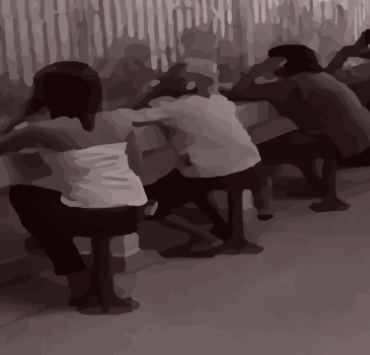
Maribel was often depressed due to Florian’s unwillingness to leave Eliza. She’d spend a string of nights at the studio followed by a week as a bedbound slug with Florent Pagny’s Savoir Aimer playing on repeat in her CD player, until Florian appeared at the House of Stars pleading through her closed door, and she’d finally let him in. I’d hear them through the thin wall that separated our bedrooms, the sound of weight shifting on her metal bed frame, the headboard slamming against the sheetrock, the sound of promises–his telling her he loved her and her inevitable desperate questioning growing louder and louder, “Then why won’t you leave her?”
That week he had a new policy of non-response. Tarentina said it was meant to keep her hopeful, and hope needs very little fuel. She called Maribel an idiot for making demands. She said only the stupidest women think an affair can exist anywhere outside the bedroom. She’d been with the Musician for years already, and his wife had yet to catch on. He wasn’t the only married man on her roster, either, but Tarentina was as discreet as a tomb, and her men knew this, which always kept them coming back.
“To be a successful mistress,” she advised, “a girl must remember the relationship comes without ownership. Love and jealousy are symptoms that the affair has expired and it’s time to gather your things and walk away.”
She compared an affair to one of Maribel’s paintings, saying no matter how obsessed she became with a piece, there always came a day when she’d look at it and know it was finished; not one more brushstroke could make it any better.
Maribel took medication for her frequent spiraling emotional states and, per her doctor’s recommendation, long walks through the Latin Quarter that were meant to clear her mind. Lately, I was the only one willing to join her. That day, we started out at Café Mabillon and were chatted up by some Swedish tourists at the next table over. They mistook us for natives, and we flexed our Parisian accents and affectations, thrilled that they couldn’t tell the difference. They were on their honeymoon, and I envied the way they checked each other’s eyes after every sentence and spoke in a dialect of We. They could be mistaken for siblings and told us they were both accountants and met while working at the same firm. They paused to look at each other, and in that instant I imagined them in bed, the man’s strawberry blond hair on the pillow, her feathery tresses against his chest.
We left them to go browse the stalls of the bouquinistes, and while Maribel checked out the book bins looking for interesting cover artwork, I eavesdropped on a brown-bearded American expat in a navy fisherman’s sweater at the next stall over as he told a pair of Mexican backpackers, in French-spattered English, how he’d come to Paris twenty-five years earlier as a philosophy student, but had fallen in love with both a woman and the city never to return home. Now he operated a stall, selling Belle Époque postcards and painting reproductions, but he was really a raconteur, a storyteller, a lover of words and the language of the soul.
I thought of my father. Once, before my graduation, I’d mentioned the possibility of changing direction and not studying diplomacy as I’d been planning. Papi thought I meant I’d join him and Santi at the family business, but when I said I was considering something more creative, he shook his head as if I’d been terribly mistaken and said there was no need for that; I was already an artist by blood–all immigrants are artists because they create a life, a future, from nothing but a dream. The immigrant’s life is art in its purest form. That’s why God has special sympathy for immigrants, because Diosito was the first artist, and Jesus, un pobre desplazado.
“It’s not the same, Papi,” I’d tried, but he shook his head.
“Pero of course it is, mijita. All your life is a work of art. A painting is not a painting, but the way you live each day. A song is not a song, but the words you share with the people you love. A book is not a book, but the choices you make every day trying to be a decent person.”
When we were on our way again Maribel looked to the American and sighed, “A thousand idiots come to Paris every day thinking they’re artists but hardly any really have it in them. Look at me. I was born and bred for this shit and I don’t even have it in me.”
“Come on, Maribel. Everybody knows you’re talented,” I said, and it was true, but everyone also knew that Maribel was a third-generation painter of commercially viable lineage, with a greater chance of making money from it than the majority of her peers.
“Basta, Lita. I know what I am. I’m a great imitator. I’m learned, not original. But people can’t tell the difference.”
She talked as we crossed through Saint Germain, and seared through cigarette after cigarette, rambling that she wanted to disappear, dissolve into the earth like spit. By the time we reached rue du Cherche-Midi, she’d worked herself into a disquieted frenzy, stopping along the wall of a building to gather forces for the rest of the walk home.
A green BMW pulled up along the curb in front of us. Its windows rolled down rolling down, and a man in one of those checked shirts with the initials sewn into the pocket that Loic owned by the dozen leaned across the passenger seat and waved us over. I thought he was asking for directions, so I stepped forward.
“I’m looking for something tropical,” he said.
I assumed “Tropicale” was the name of a bar or restaurant in the area and said I hadn’t heard of it, but he laughed and pointed to Maribel on the wall behind me.
“How much for both of you?”
He could have been a father, a doctor, or an executive, with his suit jacket neatly folded across the passenger seat. According to that gold wedding band twinkling in the window frame, he was also a husband.
“How much?” He rubbed his fingers together to make sure I understood he meant money.
I walked over to the car, slow, slinky, the way I imagined the Avenue Foch girls did when getting ready to climb into a car. I bent down to the window, smiling a smile that did not belong to me but to some other girl with solid gold cojones.
“That depends on what you want.”
“How much for the ass?”’ He was practically salivating.
I took a drag on my cigarette and turned my hips toward him.
“This ass?”
He nodded, showing me a wide symmetrical smile that must have cost a fortune.
I leaned into the window.
“This ass will cost you extra.”
I grabbed his wrist and pressed it firmly on the window frame with one hand, using my free hand to rub my cigarette into the top of his palm while he squealed in pain, trying to pull back his hand, but I was overcome with strength and held on tightly, singeing his pink skin with my cigarette. He called me putain, salope, pétasse, conasse, and many other words I didn’t know while I let him burn. Maribel finally grabbed my arm and we ran from the top of Cherche-Midi across the intersection down to rue du Bac before the gendarmes at the Varenne post stopped us, demanding to know why two girls were running in a neighborhood not known for velocity.
“We’re just going home,” I told them. We weren’t but a few meters from our green doors.
“What’s that accent?” asked the second gendarme. I could tell he was the one in charge. There is always one in charge.
“It’s not any kind of accent. It’s the way I talk.”
“Why were you running?”
I looked at Maribel, breathless and not much help, and neither of us felt there was any point in telling them the truth.
“We’re just going home.” I pointed down the road. “We live in the House of Stars.”
“Show me your papers.”
“We just stepped out for some air,” I started, ready to negotiate, but he shook his head and held his finger in the air as if determining the wind.
“Your papers. Now.”
I’d been warned that I should carry my documentation, though everyone in the neighborhood knew about Séraphine’s place and that it was full of girls from all over. But we both had only bank and métro cards on us, which didn’t prove our legitimacy enough, so they fined us five hundred francs each, in cash, which they told us we could withdraw from the bank machine around the corner.
“How convenient for you,” I told the officer who followed to make sure we didn’t make a run for it.
“You should thank me for not arresting you. Foreigners should have their papers on them at all times.”
After we handed over the bills, the bossier gendarme said, “If it’s true you live in the House of Stars, I want to see you walk into it.”
They followed as we made our way to our address, muttering about our culs, and observed as I typed the security pass code into the keypad and pushed open the door to the entrance court. They watched from the sidewalk as we crossed the courtyard and I produced a key and opened our way into the house. As we stepped into the foyer, we turned to face the guards and flipped them off: I, with the American middle finger, and Maribel, Spanish-style, with two fingers and the back of the hand. The gendarmes responded by sticking out their tongues and grabbing their crotches, thrusting in our direction, all of which, I’m sure you know, translates directly.
![]()

Patricia Engel is the author of the acclaimed books, Vida and It’s Not Love, It’s Just Paris. Her new novel, The Veins of the Ocean, is forthcoming from Grove Press in 2016.







